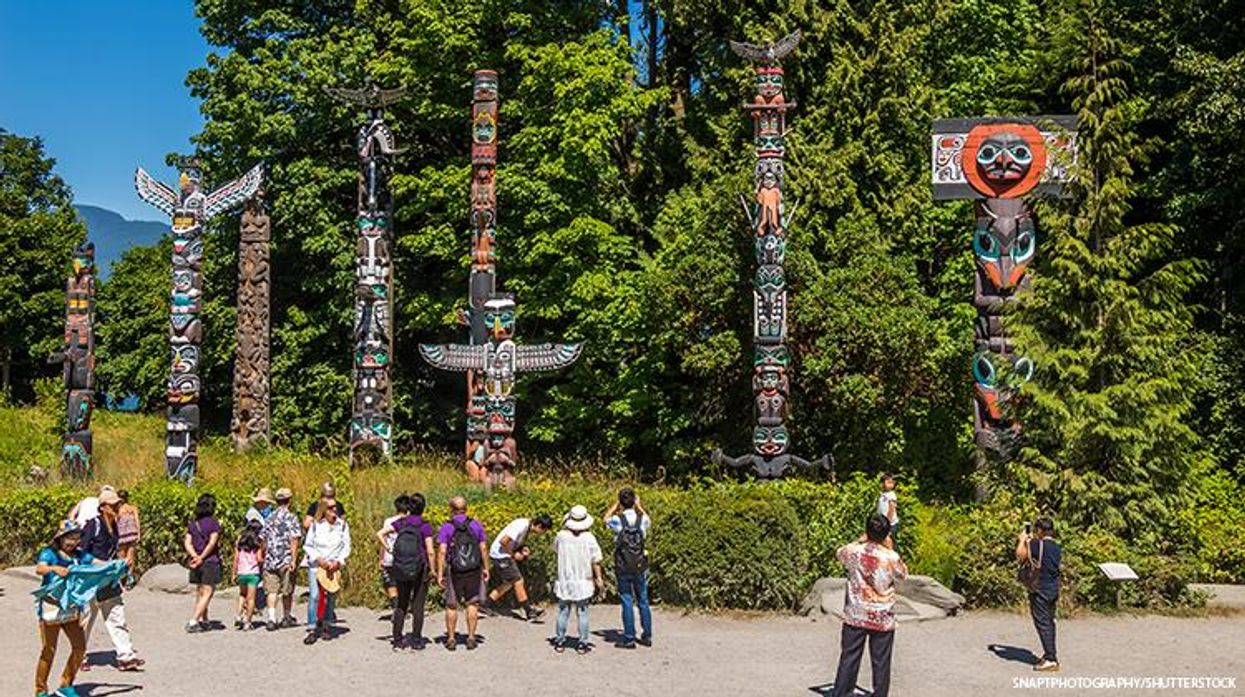Print Issue
10 Dos and Don'ts On Indigenous Land

These 10 tips will help you respectfully enjoy a culturally-enriching experience.
June 24 2022 11:00 AM EST
By continuing to use our site, you agree to our Privacy Policy and Terms of Use.

These 10 tips will help you respectfully enjoy a culturally-enriching experience.
Today, there are 574 federally recognized tribes and 200 unrecognized tribes, all whose Indigenous ancestors inhabited, cultivated, and cared for the land of the United States.
Here’s what to know while visiting America’s Indian Country. First, here are the things you should do.
1. Educate yourself.
It’s good to know a tribe’s history and culture so that you can engage in conversation with community members without expecting them to be your teacher. Educate yourself on the land, the people, and significant historical impacts. Recognize that this community has experienced intergenerational historical trauma and may have a distrust of visitors. Also, you can count on the rest of the community knowing you are there before you arrive at your destination. Word travels fast. Act accordingly.
2. Ask before participating and be patient.
Respectfully request to join in an activity or ceremony. Understand that not everything works on a clock. Ceremonies and other community events may last longer than a day — or two. You may not fully understand everything that is or will be happening, but this is a great opportunity to practice being an observer.
3. Respect traditions and values. Listen rather than talk.
Regalia, feathers, and beadwork may be sacred. So, be courteous and aware of what you are doing, touching, and pointing towards. People will generally let you know about cultural expectations (not pointing fingers at a person, for example) but that may not always be the case. Remain aware and respectful.
4. Bring money to spend.
One of the great things about having visitors on tribal land is the influx of money, which is often needed in our communities. Expect to pay full price, especially for hand-crafted traditional art. Offering less money can be seen as disrespecting the item and its creator. Know that tribal art is prepared with intention, time, and skill, and that effort should be valued as such. Very few tribes have giant revenue sources (such as casinos). That said, tribal communities continue to be reciprocal people so comparable gifts or skills can be offered as trade in exchange for cash.
5. Bring items to gift.
Arrive with some type of gift such as plant medicines (like tobacco, sage, lavender, and cedar) in case you find yourself spending time with tribal community members. Tobacco (always loose leaf, not a pack of cigarettes!) is a fairly universal gift because it can be used for trade, gifting, or ceremonially. If you are fortunate enough to receive a gift of a piece of jewelry or another culturally significant item, it is respectful to gift something in return. If you receive assistance or education, you are expected to reciprocate in some traditional way: offer a personal item, money, food, or tobacco.
Now here are the things you should avoid doing.
6. Do not take pictures without explicit permission.
Most of the time, if you ask permission to take someone’s photo, they will oblige. But if they say no, don’t take it personally. Trust there is a reason they do not want to be photographed. Smile, and thank them for their time.
7. Do not assume you know a tribe’s gender roles.
Gender roles may look very different in Indigenous cultures than in Eurocentric societies. Cultures that have celebrated Two-Spirit people for millennia may have less strict gender binaries. Native women have led nations for longer than both Queen Elizabeths’s reigns. In powwow dancing, even though dances are called “men’s” or “women’s,” all the dancers may not identify the same way. Two-Spirit folk are Native people with both male and female spirits inside them and may appear gender nonconforming. LGBTQ+ identities are alive and well in Indian Country.
8. Do not remove natural or ceremonial items.
A variety of plants, rocks, and other natural items are used in tribal ceremonies, medicines, and traditional cooking. Admire and respect that everything is where it belongs.
9. Do not try to participate in traditions or ceremonies (unless or until you’re invited).
Native traditions and ceremonies can be complex and are not performed to entertain travelers. Like other religious ceremonies and practices, these are sacred traditions that may not be open to outsiders. If you are allowed to bear witness, relish the opportunity to observe without participating. Be a student of life and be present.
10. Do not interrupt ceremonies, Elders, or daily life.
Even when a tribe encourages tourism, most of the people living on Indigenous land are simply going about their lives. They are not performing some idea of what Native American life is supposed to look like. Do not interrupt or correct people about their own traditions, names, history, or anything else. Each tribal community is not the same as another. We are very diverse in land, language, culture, and protocols. Do not presume you know better. Do not try to tell people who they are. If you have questions or comments, keep them until afterward. Then, bringing your tobacco gift, quietly present it, and ask, “Could you please tell me more about what we just saw?” Accept the answer with a smile, say “Thank you,” and go on with your day.
When traveling in Indian Country, bring a sense of joy! Laughter will flow even when a moment looks serious. Indigenous people joke around a lot. And we tease! The difference between teasing and being called out for inappropriate actions starts with awareness: are you behaving as though you are in your own home? If you are being respectful and thoughtful, likely the laughter is with you. A sense of joy in your surroundings goes a long way.
This piece initially ran in the Summer 2022 print issue. Out Traveler is available on newsstands.